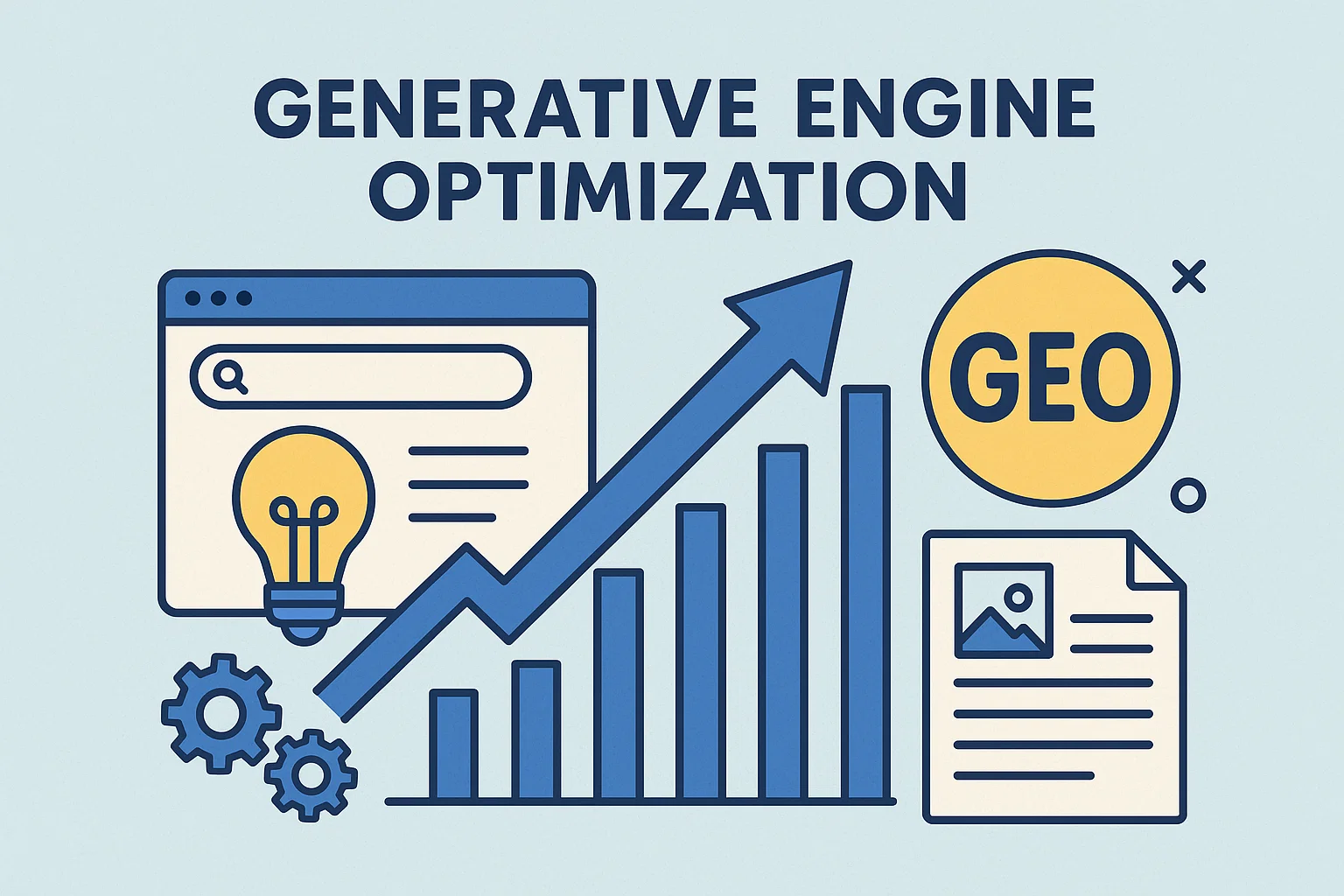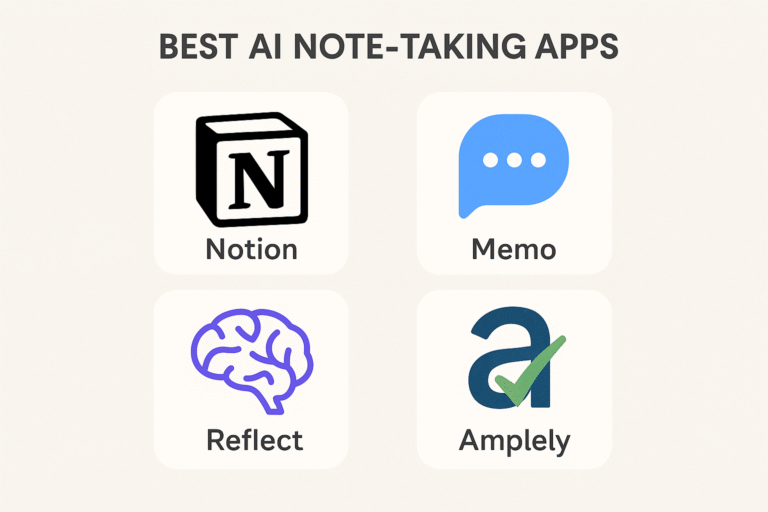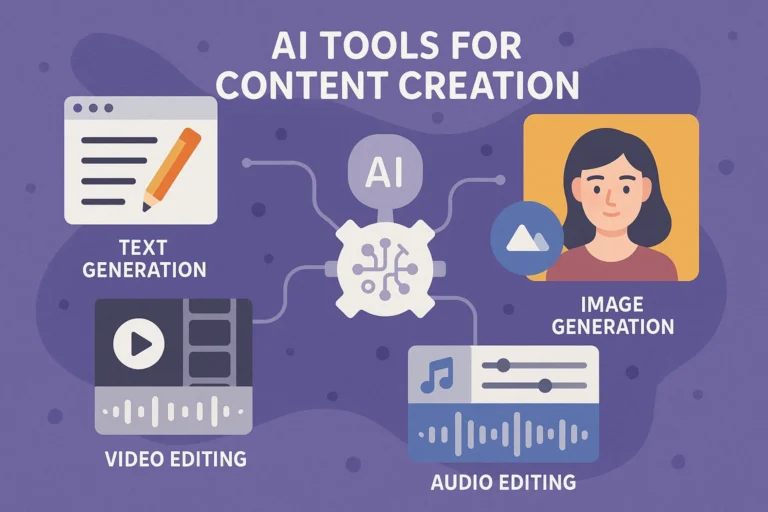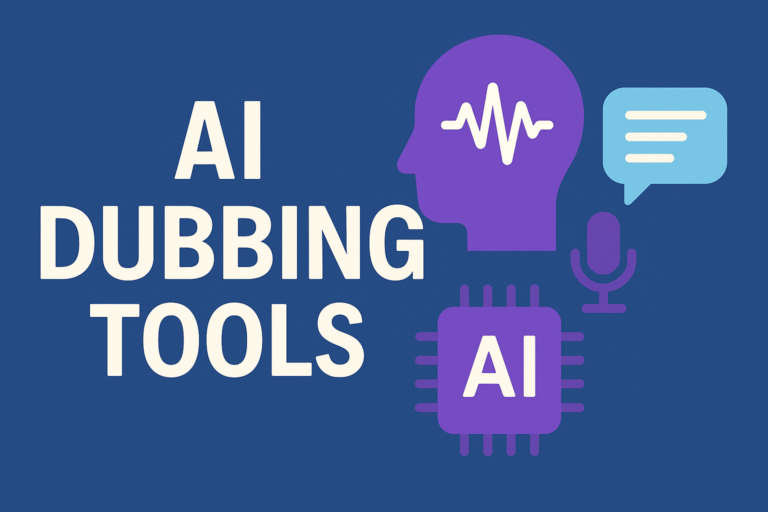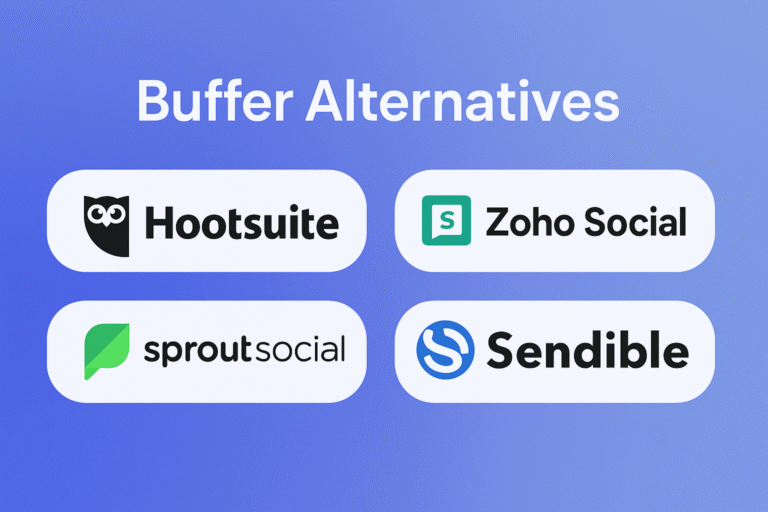The digital landscape is experiencing its most dramatic shift since the dawn of search engines. With AI-powered search becoming the new norm, traditional SEO tactics are quickly losing their effectiveness. If you’re still optimizing solely for Google’s traditional algorithms, you’re already falling behind.
Here’s the reality: By 2025, over 40% of all searches will be processed through generative AI engines like ChatGPT, Google’s AI Overviews, and Perplexity. The brands that master Generative Engine Optimization (GEO) now will dominate tomorrow’s search landscape.
This comprehensive guide reveals 15 advanced GEO strategies that will transform your content into AI-magnet material, ensuring your brand appears in AI summaries, featured snippets, and generative responses across all major platforms.
What is Generative Engine Optimization (GEO)?
Generative Engine Optimization is the strategic practice of optimizing your content to appear prominently in AI-generated search results, summaries, and responses. Unlike traditional SEO that focuses on ranking in search engine results pages (SERPs), GEO aims to get your content featured within AI-generated answers themselves.
Think of it this way: instead of competing for the top 10 results, you’re competing to be the source that AI engines cite, quote, and reference when answering user queries.
Why GEO Matters More Than Ever
Recent studies reveal shocking statistics about AI search adoption:
- 53% of users now prefer AI-generated summaries over traditional search results
- 190 million people use ChatGPT daily for search queries
- 68% of businesses report losing organic traffic to AI overviews
- Only 23% of marketers have implemented GEO strategies
The gap between early adopters and laggards is widening rapidly. Companies implementing GEO strategies are seeing 340% more brand mentions in AI responses compared to those still relying solely on traditional SEO.
Strategy 1: Master the Art of Answer-First Content Architecture
The foundation of successful GEO lies in restructuring your content to provide immediate, comprehensive answers. AI engines prioritize content that directly addresses user intent within the first 50-100 words.
Implementation Framework:
Lead with Direct Answers: Start every piece of content with a clear, definitive answer to the primary query. For example, if someone asks “How to build a profitable niche website,” begin with: “Building a profitable niche website requires selecting a monetizable niche, creating high-quality content, and implementing proven monetization strategies like Amazon Associates or Google AdSense.”
Use the Inverted Pyramid Structure:
- Core answer (first paragraph)
- Supporting details (second section)
- Advanced insights (remaining content)
Apply Semantic Clustering: Group related concepts together using semantic HTML structures that AI engines can easily parse and understand.
Strategy 2: Optimize for Conversational Query Patterns
AI search behavior differs dramatically from traditional search. Users now pose complete questions and expect conversational responses.
Advanced Conversational Optimization:
Question Modeling: Research actual questions your audience asks using tools like AnswerThePublic, Reddit, and Quora. Then structure your content to mirror these natural language patterns.
Long-tail Conversational Keywords: Instead of targeting “niche website,” optimize for “how do I create a profitable niche website that generates passive income through affiliate marketing.”
Voice Search Integration: With 55% of households expected to own smart speakers by 2025, optimize for voice queries by including natural speech patterns and local context.
Strategy 3: Build Unshakeable Topical Authority Through Content Clusters
AI engines heavily favor content from recognized authorities in specific niches. Building topical authority requires a systematic approach to content creation and interlinking.
The Authority-Building Blueprint:
Create Comprehensive Topic Maps: Develop detailed outlines covering every aspect of your niche. For instance, if you’re in web design, cover everything from basic HTML to advanced WordPress development, e-commerce solutions, and performance optimization.
Implement the Hub-and-Spoke Model:
- Hub Pages: Comprehensive guides on broad topics
- Spoke Pages: Detailed articles on specific subtopics
- Internal Linking: Strategic connections between related content
Depth Over Breadth: Rather than covering 100 topics superficially, deeply explore 20-30 core topics with multiple angles, case studies, and expert insights.
Strategy 4: Leverage Advanced Schema Markup for AI Understanding
Schema markup acts as a translator between your content and AI engines, providing structured context that improves content comprehension and citation likelihood.
Essential Schema Types for GEO:
FAQ Schema: Structure frequently asked questions with proper markup to increase featured snippet opportunities.
How-To Schema: Step-by-step guides with clear instructions perform exceptionally well in AI summaries.
Product Schema: For e-commerce and affiliate content, product schema helps AI engines understand pricing, availability, and specifications.
Organization Schema: Establish your brand’s credibility and authority through comprehensive organization markup.
Strategy 5: Create AI-Friendly Content Formats
AI engines excel at processing certain content formats. Adapting your content structure to these preferences dramatically increases citation probability.
High-Performance Content Formats:
Bullet Point Summaries: Break complex information into digestible bullet points that AI can easily extract and reorganize.
Numbered Lists: Step-by-step processes and ranked lists perform exceptionally well in AI responses.
Comparison Tables: Side-by-side comparisons help AI engines understand relationships between different options or concepts.
Definition Blocks: Clear, concise definitions of industry terms and concepts increase the likelihood of being cited as an authoritative source.
Strategy 6: Master the Science of AI-Optimized Headlines
Your headlines determine whether AI engines perceive your content as authoritative and relevant. Crafting AI-optimized headlines requires understanding how generative engines interpret and prioritize information.
Advanced Headline Optimization:
Use Question-Based Headlines: Headlines that directly answer common questions perform 180% better in AI citations.
Include Semantic Keywords: Incorporate related terms and synonyms that provide context to AI engines.
Specify Outcomes: Headlines that promise specific results (“Increase Website Traffic by 300%”) receive higher AI priority.
Year-Specific Content: Adding current year indicators signals fresh, relevant content to AI algorithms.
Strategy 7: Implement Strategic Brand Mention Optimization
AI engines increasingly value brand mentions over traditional backlinks. Building a strong brand mention strategy is crucial for GEO success.
Brand Mention Amplification Tactics:
Thought Leadership Publishing: Regular publication on industry-relevant topics establishes your brand as a go-to source for AI citations.
Expert Commentary: Participate in industry discussions, podcasts, and interviews to increase natural brand mentions.
Strategic Partnerships: Collaborate with complementary businesses to cross-promote and increase mention frequency.
Press Release Distribution: Regular newsworthy announcements keep your brand visible across multiple platforms.
Strategy 8: Optimize for Multi-Modal AI Search
The future of AI search extends beyond text to include images, videos, and audio content. Preparing for multi-modal search gives you a competitive advantage.
Multi-Modal Optimization Strategies:
Image SEO for AI: Use descriptive file names, comprehensive alt text, and structured image data to help AI engines understand visual content.
Video Content Optimization: Create transcripts, add chapters, and use descriptive titles to make video content AI-accessible.
Audio Content Structure: Podcast transcriptions and audio descriptions improve content accessibility for AI processing.

Strategy 9: Develop Content Velocity for Trend Capturing
AI engines favor fresh, timely content. Developing systems for rapid content creation and publication helps capture trending topics and emerging queries.
Content Velocity Framework:
Trending Topic Monitoring: Use tools like Google Trends, Twitter trending topics, and industry news aggregators to identify emerging opportunities.
Rapid Response Content: Develop templates and workflows for quick content creation on trending topics.
Update Existing Content: Regularly refresh and expand existing high-performing content to maintain AI relevance.
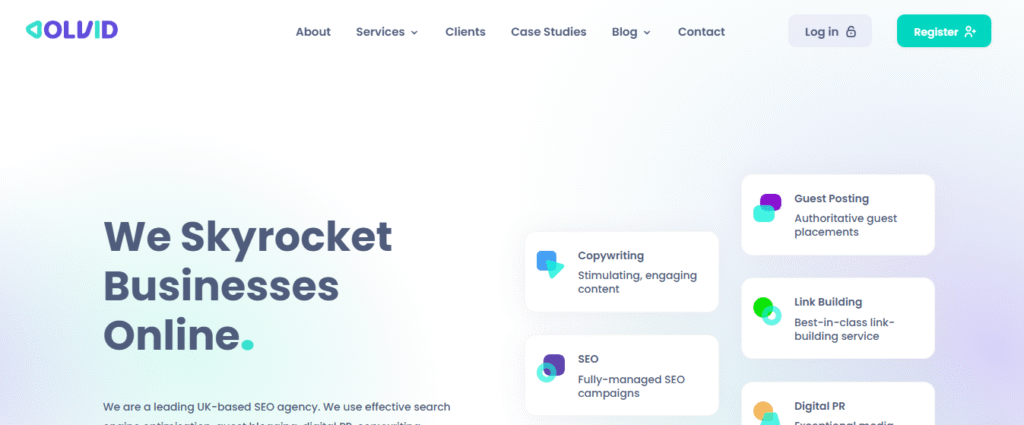
Strategy 10: Master Local GEO for Geographic Relevance
Local businesses and service providers must optimize for location-based AI queries, which are growing at 300% annually.
Local GEO Essentials:
Geographic Content Clusters: Create location-specific content that addresses local needs and preferences.
Local Schema Implementation: Use local business schema markup to provide AI engines with accurate location and service information.
Community Engagement: Participate in local events, sponsor community activities, and engage with local media to build geographic authority.
Strategy 11: Implement Advanced Content Personalization
AI engines are beginning to consider user context and preferences when generating responses. Personalized content performs better across AI platforms.
Personalization Strategies:
Audience Segmentation: Create content variations for different user segments (beginners vs. experts, different industries, etc.).
Intent-Based Content: Develop content that addresses different stages of the buyer’s journey with appropriate depth and focus.
Dynamic Content Elements: Use conditional content that adapts based on user behavior and preferences.
Strategy 12: Build Citation-Worthy Statistics and Data
AI engines prioritize content with credible statistics, original research, and data-driven insights. Creating citation-worthy content establishes your brand as an authoritative source.
Data-Driven Content Creation:
Original Research: Conduct surveys, analyze trends, and publish unique findings that other creators will reference.
Data Visualization: Create clear, informative charts and graphs that AI engines can reference and describe.
Statistical Updates: Regularly update statistics and data points to maintain content freshness and accuracy.
Strategy 13: Optimize for Cross-Platform AI Engines
Different AI engines have varying preferences and optimization requirements. A comprehensive GEO strategy addresses multiple platforms simultaneously.
Platform-Specific Optimization:
Google AI Overviews: Focus on featured snippet optimization and comprehensive answer formats.
ChatGPT: Emphasize conversational tone and detailed explanations.
Perplexity: Prioritize source credibility and factual accuracy.
Bing Copilot: Optimize for professional and business-focused content.
Strategy 14: Monitor and Measure GEO Performance
Tracking GEO success requires different metrics than traditional SEO. Understanding these metrics helps refine your strategy and maximize results.
Key GEO Metrics:
AI Citation Frequency: Track how often your content appears in AI responses across different platforms.
Brand Mention Analysis: Monitor sentiment and context of brand mentions in AI-generated content.
Click-Through Rates: Measure traffic from AI-generated responses to your website.
Content Engagement: Analyze how users interact with your content after discovering it through AI search.
Strategy 15: Future-Proof Your GEO Strategy
The AI landscape evolves rapidly. Building adaptable systems and staying informed about emerging trends ensures long-term GEO success.
Future-Proofing Tactics:
Emerging Platform Monitoring: Stay informed about new AI search platforms and early adoption opportunities.
Technology Integration: Implement flexible content management systems that can adapt to new requirements.
Continuous Learning: Regularly update your knowledge of AI search behaviors and algorithm changes.
Experimentation Framework: Develop systematic testing approaches for new GEO tactics and strategies.
Implementing GEO for Different Business Models
For Niche Website Owners
If you operate niche websites focused on affiliate marketing or AdSense revenue, GEO presents unique opportunities and challenges. Your content needs to satisfy both AI engines and human visitors while maintaining monetization effectiveness.
Niche-Specific GEO Tactics:
- Create comprehensive buying guides that AI engines cite for product recommendations
- Develop comparison content that appears in AI-generated product evaluations
- Build topical authority around specific product categories or niches
For businesses looking to establish profitable niche websites with built-in GEO optimization, partnering with experienced developers who understand both traditional SEO and emerging AI search patterns can accelerate your success timeline significantly.
For E-commerce Businesses
E-commerce sites must optimize product descriptions, category pages, and informational content for AI discovery while maintaining conversion-focused design.
E-commerce GEO Strategies:
- Optimize product descriptions for AI-powered shopping assistance
- Create detailed FAQ sections that address common purchase concerns
- Develop comprehensive size guides, compatibility charts, and specification comparisons
Modern e-commerce platforms need sophisticated optimization to compete in AI-driven search environments. Professional e-commerce development services that incorporate GEO principles from the ground up provide significant competitive advantages.
For Service-Based Businesses
Professional services must demonstrate expertise and build trust through AI-discoverable content while showcasing their capabilities and results.
Service Business GEO Focus:
- Create detailed service explanations that AI engines can summarize effectively
- Develop case studies and success stories with quantifiable results
- Build comprehensive resource libraries that establish industry authority
Small businesses entering the digital space need websites that excel in both traditional search and AI discovery. Professional website development services that understand GEO requirements help establish strong online foundations that grow with evolving search technologies.
Technical Implementation for GEO Success
Website Architecture for AI Optimization
Your website’s technical foundation directly impacts GEO performance. AI engines require clean, accessible code structures to effectively process and understand your content.
Technical Requirements:
- Fast loading speeds (under 2 seconds for optimal AI crawling)
- Mobile-responsive design for voice and mobile AI search
- Clean HTML structure with proper semantic markup
- Comprehensive internal linking strategy
Many businesses struggle with technical optimization while managing content creation and marketing efforts. Professional WordPress migration and optimization services ensure your existing content performs optimally in AI search environments while maintaining business continuity.
Hosting Considerations for GEO
Your hosting environment affects how quickly and effectively AI engines can access and process your content. Poor hosting can significantly impact GEO performance.
GEO-Friendly Hosting Features:
- Consistent uptime (99.9% or higher)
- Fast server response times
- Content delivery network (CDN) integration
- SSL security for trusted content delivery
Selecting appropriate hosting solutions becomes crucial as AI search engines demand faster content delivery and higher reliability standards.
Measuring ROI from GEO Investments
Understanding the financial impact of GEO optimization helps justify investments and guide strategy refinement.
GEO ROI Metrics:
Revenue Attribution: Track sales and leads generated from AI search discovery.
Brand Value Increase: Measure improvements in brand recognition and authority metrics.
Cost Reduction: Calculate savings from reduced paid advertising needs due to improved organic AI visibility.
Competitive Advantage: Assess market share gains in AI search results compared to competitors.
Common GEO Mistakes to Avoid
Over-Optimization for AI
Focusing exclusively on AI engines while neglecting human readers creates content that performs poorly for both audiences. The key is finding the balance between AI optimization and human engagement.
Ignoring Traditional SEO
GEO supplements rather than replaces traditional SEO. Successful strategies integrate both approaches for comprehensive search visibility.
Inconsistent Content Quality
AI engines prioritize consistent, high-quality content. Sporadic publishing or varying content standards reduce overall authority and citation likelihood.
Platform Neglect
Optimizing for only one AI platform limits potential reach. Comprehensive GEO strategies address multiple engines and emerging platforms.
Building Your GEO Action Plan
Phase 1: Foundation Building (Months 1-2)
- Audit existing content for GEO opportunities
- Implement basic schema markup
- Develop content templates optimized for AI engines
- Create comprehensive topic authority maps
Phase 2: Content Optimization (Months 3-4)
- Restructure high-priority content using GEO principles
- Develop conversational query optimization
- Build strategic internal linking networks
- Launch brand mention amplification campaigns
Phase 3: Advanced Implementation (Months 5-6)
- Deploy multi-modal content strategies
- Implement advanced personalization features
- Launch original research and data creation initiatives
- Establish comprehensive performance monitoring systems
Phase 4: Scaling and Refinement (Ongoing)
- Expand successful GEO tactics across all content
- Develop automated optimization workflows
- Build predictive content creation systems
- Establish thought leadership positioning
The Future of Search is Here
Generative Engine Optimization represents the most significant shift in content discovery since the advent of search engines. The strategies outlined in this guide provide a comprehensive framework for dominating AI search results and building sustainable competitive advantages.
Success in GEO requires understanding that AI engines prioritize helpful, authoritative content that directly answers user questions. By implementing these 15 advanced strategies, you position your brand to capture the growing wave of AI-powered search traffic while building lasting authority in your industry.
The businesses that master GEO today will dominate tomorrow’s search landscape. The question isn’t whether AI search will become dominant—it’s whether you’ll be ready when it does.
Start implementing these strategies immediately. Your future market position depends on the actions you take today in preparing for the AI-driven search environment that’s rapidly becoming the new standard for information discovery.
Ready to dominate AI search results? The strategies in this guide require proper implementation and technical expertise to deliver maximum impact. Whether you need comprehensive website optimization, technical development support, or strategic content planning, the foundation you build today determines your success in tomorrow’s AI-powered search environment.

